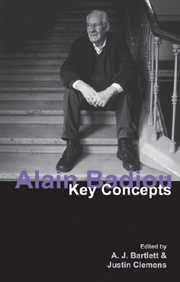Book contents
- Frontmatter
- Contents
- Contributors
- Acknowledgements
- Abbreviations
- Miscellaneous Frontmatter
- Introduction: Badiou's form
- 1 Biography and early works
- PART I THE FOUNDATIONS OF BADIOU'S THOUGHT
- PART II BADIOU'S KEY CONCEPTS OR “CONDITIONS”
- 6 Science
- 7 Love
- 8 Art
- 9 Politics
- PART III BADIOU'S ENGAGEMENT WITH KEY PHILOSOPHERS
- Afterword: Badiou's futures
- Bibliography
- Index
9 - Politics
from PART II - BADIOU'S KEY CONCEPTS OR “CONDITIONS”
- Frontmatter
- Contents
- Contributors
- Acknowledgements
- Abbreviations
- Miscellaneous Frontmatter
- Introduction: Badiou's form
- 1 Biography and early works
- PART I THE FOUNDATIONS OF BADIOU'S THOUGHT
- PART II BADIOU'S KEY CONCEPTS OR “CONDITIONS”
- 6 Science
- 7 Love
- 8 Art
- 9 Politics
- PART III BADIOU'S ENGAGEMENT WITH KEY PHILOSOPHERS
- Afterword: Badiou's futures
- Bibliography
- Index
Summary
In 1985, Alain Badiou published a short but essential book, Peut-on penser la politique? (Can politics be thought?) In it, he set out his reasons for deconstructing the “metaphysics” of Marxism–Leninism – a political tradition he had actively sought to shape in the period after May '68 – and introduced some of the concepts that have since come to be associated with his philosophy, in particular that of the event. But the title of book can also be seen to indicate a concern that has defined Badiou's entire philosophical career, from his early attempt to complement Althusserian Marxism to his very recent call to explore and renew “the communist hypothesis” (1967; 2009c). If the conditions of science (mathematics) and art (poetry) determine Badiou's mode of presentation and enquiry, politics plays a motivating role in Badiou's philosophy (TW xvi). Many of the distinctive features of Badiou's philosophy originate in politics: an attempt to formulate a partisan but universalizable conception of truth; an emphasis on the emergence of subjectivity from contingent occurrences, and its persistence in the guise of militancy; a preoccupation with collective forms of action and organization; and an understanding of novelty as a revolutionary transformation in which, following the Internationale, those (or that) which was nought shall at last be all.
Despite Badiou's abiding attempt to think politics, both as a philosopher and as a political militant, isolating a concept of politics in his work is problematic. Badiou is firmly opposed to the widespread idea of philosophy as a discipline that would produce judgements about the proper forms of government, enquire into the formation of public opinion or evaluate the moral probity of particular political actions.
- Type
- Chapter
- Information
- Alain BadiouKey Concepts, pp. 94 - 104Publisher: Acumen PublishingPrint publication year: 2010
- 4
- Cited by

